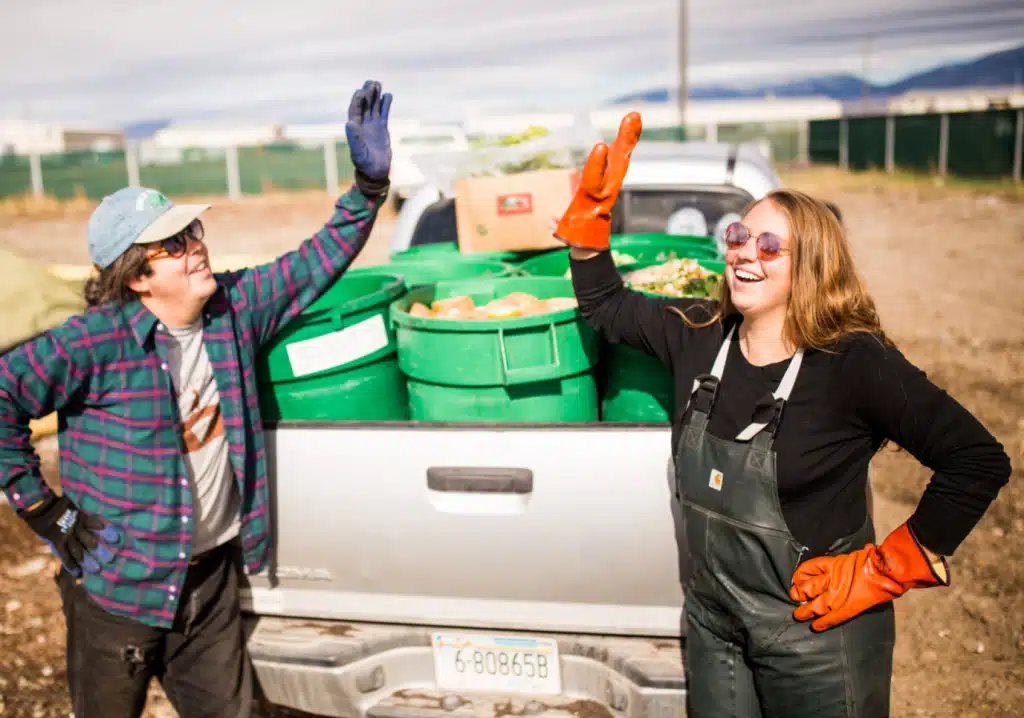Closing the Loop in Local Food Waste

On a smoky July day, with temperatures hanging just below 100° F, I visit with Adrienne Huckabone and Ryan Green, the husband and wife duo behind Happy Trash Can, in Bozeman. Around a bend at the Bozeman Convenience Site where their composting operation sits, I find Adrienne and Ryan finishing up the day’s work, wearing waterproof bibs over shorts and T-shirts. We stand amidst food waste windrows as they talk me through their Aerated Static Pile system (ASP), which pumps air into compost piles in place of turning them by hand, minimizing labor and machine costs.
With dense smoke hovering over the Gallatin Valley, the compost windrows look like geologic formations from another planet, the Skid-steers like space rovers. Fires, grasshoppers, and drought across Montana have put in perspective the new

challenges facing agriculture across the state.
“It’s hard to not look at the smoke and feel a sense of urgency. Composting is just our way of being a cog in the food system,
to do our part to repair things,” says Adrienne.
Founded in 2016, Happy Trash Can is the first composting service in the Gallatin Valley, and maintains a formidable
impact, reclaiming food from 900 area households and 50-60 commercial businesses. All finished compost is available for pick-up by subscribers and local farms, including Calliope Flowers, Gallatin Valley Botanical, Kokoro Flowers, Bridger Farms, and Foxglove Flower Farm.
In January 2021, Adrienne and Ryan began an even more transformative project: partnering with the City of Bozeman Solid Waste Division to implement a municipal composting program in the rapidly growing city. They hope that this partnership can create robust composting infrastructure that can be replicated elsewhere in Montana and the U.S. more broadly.
“We all feel the impact of climate change, and this is our way of implementing a system that will hopefully have the greatest effect in the local community. Change doesn’t start at the top, it starts at the bottom.”

“The partnership with the City allows us to operate with a larger network in our community, while using the hauling equipment the city already has in place. It’s a mutually rewarding relationship,” said Ryan.
For Happy Trash Can, creating infrastructure for composting goes beyond the act of transforming food waste into fertile compost.
“It’s so much more than a private business. We all feel the impact of climate change, and this is our way of implementing a system that will hopefully have the greatest effect in the local community. Change doesn’t start at the top, it starts at the bottom,” says Adrienne.

Indeed, for Adrienne and Ryan, “closing the loop” is their goal, transforming would-be waste into fertilizer for the Valley.
They prioritize making their compost accessible for as many as possible, using a pay-what-you-can model for pick-ups and drop-offs, and paying their employees at least $15 an hour for their work. In the months during the COVID-19 shut-down, they faced a lot of uncertainty about their business with many restaurant closures and customer fears. I ask them what keeps them coming back every day.
Adrienne points to a compost pile in its early stages of decomposition. “For me, it’s all a transformative process. Each step has a different look, smell, feel. I love lifting up the tarp and finding mushrooms underneath.”

Ryan adds, “I love connecting with people over waste. Take something as seemingly trivial as a banana peel – there is a beneficial impact of putting that in the compost rather than trash. That’s contributing to water, soil, nutrient cycles, and human and environmental health in the Gallatin Valley.”
Standing beside the piles of food and yard waste, the two make a small but mighty duo.
“All actions have consequences,” says Ryan. “All that we do is interconnected. It’s so much more about food systems than just composting. It’s about climate justice and social justice.”
Adrienne picks a small bouquet of fake flowers out of the yard waste windrow: “who the heck would put fake flowers in their compost?”



To purchase rich compost from Happy Trash Can, or to sign-up for their municipal composting program, visit their website, which can be found on their Abundant Montana listing.
